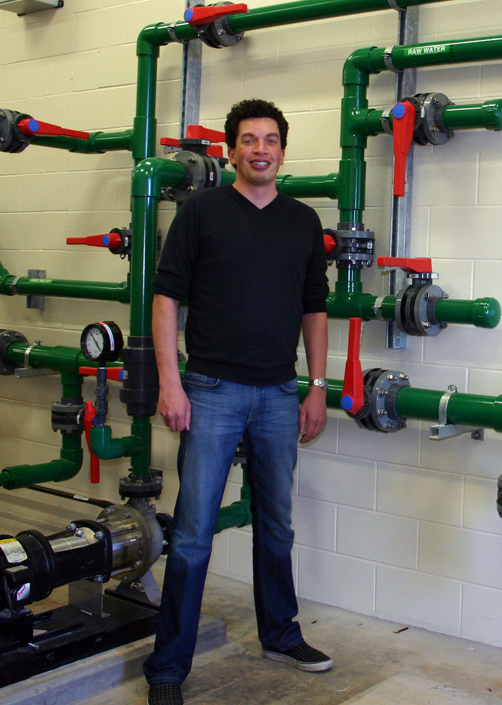The practice of using chlorine to disinfect drinking water is arguably the most important public health achievement in the last one hundred years. However, like many beneficial processes, disinfection is not without its drawbacks. When chlorine is added to water, it reacts with natural organic matter to form a suite of chemicals, called disinfection byproducts. Since the 1970s, scientists have identified over six hundred of these chemicals, many of them suspected carcinogens. Julian Fairey, assistant professor of civil engineering, is looking for ways to reduce the amount of these toxic byproducts that form in our drinking water.
Fairey has been awarded a Faculty Early Career Development, or CAREER, award from the National Science Foundation. The award of $404,969 over five years supports Fairey’s research to reengineer carbon nanotubes to remove natural organic matter from water prior to disinfection.
“We are excited that the National Science Foundation has recognized the truly visionary research proposed by Dr. Fairey,” said Kevin Hall, head of the department of civil engineering. “He demonstrates an exceptional ability to relate next-generation technology with pressing issues facing us today. We look forward to his continued leadership in the environmental engineering field.”
Carbon nanotubes, which are sheets of carbon molecules rolled into cylindrical shapes, could be integrated into existing water treatment processes to absorb natural organic matter. This matter originates from decaying of leaves and soil, and is produced by algae in lakes and rivers. Fairey explained that while carbon nanotubes have been extensively studied in other fields such as electronics, optics and materials science, their tunable surface properties have not been tailored to remove precursors of disinfection byproducts. He plans to change that by optimizing the surface chemistry of carbon nanotubes for enhanced adsorption of natural organic matter.
Fairey’s project also includes an extensive educational component. As part of an effort to get students interested in global water issues, his grant will fund oppotunities for undergraduate civil engineering students to participate in a summer program in Belize. In this program, they will get a first-hand look at the basic water quality and sanitation issues that exist around the world.
Fairey came to the University of Arkansas in 2008, after completing a post-doctoral research position at Carnegie-Mellon University. He received a bachelor’s degree in civil engineering from the University of Alberta in Canada and a master’s degree and Ph.D. from the University of Texas at Austin.
Contacts
Camilla Medders, director of communications
College of Engineering
(479) 575-5697,
